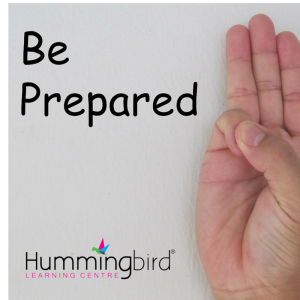Just for a moment imagine that sitting an exam was the easiest thing in the world to do. What would have had to have happened in order for it to be so? Is it possible that it would look like this?
- You are Prepared

In the week before the exam you would have gotten a lot of sleep. You would have listen to non-lyrical music and perhaps even a guided meditation to reduce your stress levels and take you into deep, revitalising sleep. You would have prepared all of the tools that you needed to bring into the test centre; pens of varying colours, pencils, erasers, correction fluid, calculator, rulers and other equipment. You keep them all together & bring them into every exam, that way you know that you have all the resources that you need.
Your bedroom is tidy and an oasis of calm. Your study area is structured and free from clutter, someone, the exam fairy, has kept it like this for you in the lead up to and during your exams, allowing you to focus. When you are organised and tidy you feel powerful and you brought that feeling with you as you studied and aced the exams.
This fairy has also ensured that you are eating correctly, a satisfying breakfast, nutritious snacks like nuts and a tantalising, tasty lunch & dinner awaits you every day. Wholesome, good food that fills you up and keeps your energy levels constant. You drink plenty of water but sip it throughout the day, keeping the body and brain hydrated.
- You are Relaxed
You practiced relaxing. You know that our greatest weapon against stress is our ability to choose one thought over another. You know that when you felt overwhelmed in the past, you were able to stop and back up and you broke everything into smaller manageable chunks. This is what you did when you were studying. You shift your state into one of calm assurance by choosing to focus on controlling your breathing – in for 4 seconds, hold for 7 seconds, out for 8 seconds. You keep your feet firmly on the floor and push down.
You took lots of breaks, by studying in blocks of 25 minutes and then walking away from it and doing something else for 5 minutes. You were sure to avoid distractions like social media, TV and your phone and kept them away from your study area.
You exercised. You continued with your sports albeit perhaps not quiet at the same intensity for the final weeks but you kept playing or simply took a regular energetic walk, run or cycle. Whatever you did, it got oxygen into your lungs, got the blood pumping and cleared your head, making you so relaxed.
- You Visualised the Exam Going Well
Like an elite athlete, you regularly imagined yourself doing your exam and it going really well. You saw yourself doing every single thing from getting up in the morning, eating breakfast, arriving at the exam hall, doing the exam, leaving and returning home. You saw this in vivid detail, with you relaxed and happy and in control during the exam. This created a type of muscle memory so that when you actually went in to the real exam, your brain felt it was just running a familiar pattern and so it simply continued to replicate that pattern.
- You had an Exam Routine
Again, like an elite athlete, you had a pre-match routine and a plan of action. As part of your pre-exam routine you distanced yourself from your pals for the 10 minutes before the exam. This kept you from being infected with any jitters that they may have had. You did your breathing exercises and went through your visualisations. Once in the exam hall, you set aside a section in your answer sheets for rough work and clearly marked it as rough work. You read every question slowly and carefully. You then put down your paper, looked up and away & thought of something completely different for 30 seconds. Then you re-read the paper and chose the questions that you were going to answer. You wrote down your buzzwords and ran your movies of the answers. Only when you were confident that you had all that you needed, you began to write. You knew that your sub-conscious mind was working on the other questions at the same time.
- You had a Post Exam Plan.
 You avoided the post-mortem by having a plan for straight after the exam. You focused on the upcoming exams rather than dissecting the exam you had just finished and therefore could no longer control. You ate well after the test and took some light exercise to release the tension & fatigue in your body. You did some light revision, confident that the next exam, like the others were going to be a breeze.
You avoided the post-mortem by having a plan for straight after the exam. You focused on the upcoming exams rather than dissecting the exam you had just finished and therefore could no longer control. You ate well after the test and took some light exercise to release the tension & fatigue in your body. You did some light revision, confident that the next exam, like the others were going to be a breeze.
Elaine Sparling is the CEO of the Hummingbird Learning Centre who help adults and children maximise their learning potential. Based in Adare, Co Limerick, she can be contacted on 087-2996054, through their website www.hummingbirdlearning.com or on Facebook





